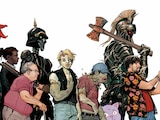Yes, it features clockwork metahumans, psychedelic mind control and murderous art patrons in Guy Fawkes masks, but what Pennyworth is really about this season is fatherhood—what it means to have a father, what it means to be a father and what it means to lose a father. Yet, while it’s really come to a head over these recent episodes, undercurrents have been there since the series’ beginning.
Season one really had much to say about Alfred Pennyworth’s relationship with his own father and getting out from under his expectations. Alfie’s father, Arthur Pennyworth, spent his life as a butler serving England’s elite, until got caught up in right-wing extremism, joined the Raven Society and attempted to assassinate the queen. After that whole sequence of events, why on Earth would the younger Pennyworth want to follow in his dad’s footsteps? Heck, considering Alfie was the one who foiled the assassination attempt by shooting his own father, it’s a wonder he’s able to function at all.

Certainly, he spent a lot of season two in a dark place. Granted, it was wartime—most of England was in a dark place. Alfie fit right in. But mentally and emotionally, he was dealing with even heavier stuff than the rest of his fellow countrymen, which drove him into the employ of another father figure—Alfred’s former army captain, Gulliver Troy. While Arthur was angry and misguided, it never resulted in toxic behavior towards his family. Gully, on the other hand, was abusive and harbored an explosive, violent temper. If he was ever a good person, he wasn’t any more. True, Alfie didn’t help things by hooking up with Gully’s wife (dark place, remember?), but Gully’s destructiveness to everyone around him had roots that ran much deeper than that.
Letting Gully back into his life was never going to end well for Alfie. And once again, to save his own life and others, he was forced to nearly kill someone who at one point had been very much a father to him.
But here’s where it gets interesting—while both Arthur and Gully could have died as a result of Alfie’s actions, they both lived, which gave them a chance to consider what they had done. It gave them both a chance at redemption and reconciliation with Alfie.
That’s important because without that, Alfie’s opinion on fathers would be pretty awful and the idea of him as a parent would likely be intolerable to him. And that would be a real problem because as we learned last week, he’s going to be one.

The news that Sandra’s pregnant certainly wasn’t expected and couldn’t have been welcome news for Alfie. We know that he doesn’t like babies and his lifestyle certainly isn’t conducive to parenthood. Unsurprisingly, his initial reaction was…well, not warm and supportive. It’s disappointing considering that he obviously cares about Sandra, but what’s fascinating is that it’s Gully who gets Alfie to step up.
While his toxic behavior may be tempered somewhat, Gully still isn’t all that happy with his life—something that’s perhaps a bit more understandable this season now that he’s developed superpowers that have cost him his freedom and are slowly killing him to boot. Earlier this season, we saw Gully take an entire pub hostage as a way of rebelling against his imprisonment. By last week’s episode, his state has devolved so badly that he’s pretty much ready to die.
Sadly, he gets his wish while on a mission with Alfie and Dave Boy, but before he does, he learns that Alfie’s going to be a father and his excited reaction to the news is everything Alfie’s wasn’t. In fact, for the first time this season—hell, probably throughout the entire series—Gully looks happy. He talks about how fatherhood changes everything and gives life meaning, and in a truly noble act (noble sacrifice is something Gully does seem pretty good at), he dies to ensure that Alfie can escape and live.

It's fascinating to speculate about why Alfie’s news seems to change everything for Gully, though I suspect the captain came to regret pushing away those he loved and considered family. He learned to appreciate family’s importance in a way that Alfie hasn’t yet realized.
I do wish Gully hadn’t made Alfie promise to take responsibility for his child. It makes it a bit less clear whether it’s something Alfie genuinely wants to do or if he’s doing it because he feels like it’s an obligation. (To be clear, it is an obligation, but you don’t want that to be the only reason he proposes to Sandra.)
I’m hoping we’ll eventually learn that’s not the case, and that Alfie embraces being a parent because it’s something he wants. We’ll have to see. But you would think more than anyone, Alfred Pennyworth knows what it’s like for a child to lose a father. He’s lost two of his own, after all. He’s met and aided children who lost their parents during the war. He saw how much the loss of Zahra Khin’s father shattered her and how much she was willing to risk just for the chance of getting him back. Alfie also saw how hurt and angry she was when she learned he was responsible—I doubt he wants his own child feeling the same way about him for not being around.

Alfie may not think of himself as a family man, and he’s not. Or rather, he’s not a typical family man. He’s someone who I believe eventually grows to understand the importance of family because he realizes the fragility of it—whether it’s his mother’s grief over her husband and her uncertain attempts to find love again, or Sully longing to see his wife one last time but unable to leave the country to visit her, or how old family demons seem to be slowly destroying the Waynes’ marriage. Family is important, but it’s not permanent and it’s never guaranteed. It’s an understanding that Alfie is just now starting to figure out, but it’s one that will be absolutely crucial much later in life, when he’ll once again be confronted with a child who’s lost his parents.
And this time, we know he won’t hesitate to step up.
New episodes of Pennyworth: The Origin of Batman's Butler drop Thursdays on HBO Max. Keep up with Alfie's latest exploits on our official Pennyworth series page.
Tim Beedle covers movies, TV and comics for DC.com and writes our monthly Superman column, "Super Here For..." Look for him on Twitter at @Tim_Beedle.
NOTE: The views and opinions expressed in this column are solely those of Mandy Curtis and do not necessarily reflect those of DC Entertainment or Warner Bros.















